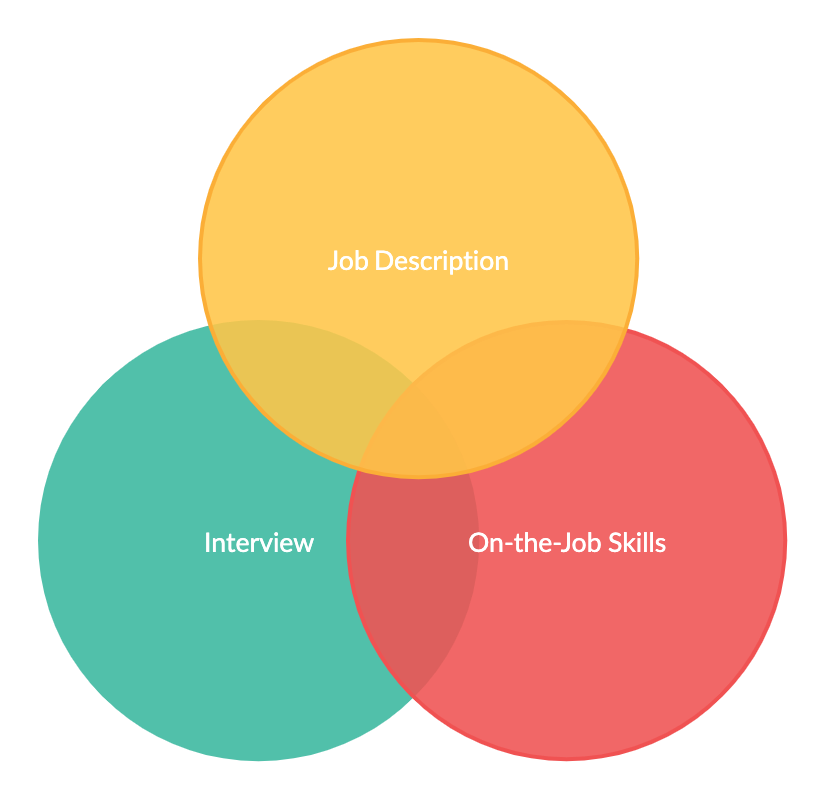Notes on Cohousing and Coliving
In pursuit of a more perfect union, let me live with my best friends.
I’ve met with a number of instructors, employed engineers, and technical recruiters and one aspect of the job search keeps jumping out to me. While I’m writing from the perspective of a data scientist, it likely applies to every industry and career.
When it comes to the job search, there is not one set of skills to know but more like three: the skills listed in the job description, the skills tested in the interview, and then the actual on-the-job skills.

In an ideal world, the recruiter, hiring manager, and team lead are the same person and have perfect insight into your skillset. That’s rarely the case. A lot of DS job descriptions are written up by HR departments run by people that think things like Hadoop are still cutting edge big data tools. Or that “predictive analytics” is a specific enough description of a skill, when your eventual team may expect things as diverse as improving a dashboard item, creating an inference pipeline, or making data visualizations. This means sometimes checking boxes that may by ultimately “useless” in that you don’t use them on the job but not having would get you binned by an HR department or recruiter.
The interview is another filter that may test skills entirely apart from on-the-job competency. It’s a point of controversy in tech, but whiteboarding problems are still a popular measure of skill which introduce a lot of noise: nerves and anxiety around performing under pressure in front of strangers or their tendency towards algorithms or leetcode problems which aren’t always representative of real-world work. Another consideration is the relative ease of administering a SQL quiz at an interview instead of handing you a project to spend two weeks on and report back findings.
What does this all mean? This means that the work being done by the folks you meet at conferences, the various skills of real data scientists, may not be the exclusive set you should be leveling up. There are other filters you should be aware of when self-studying.
1) Make a list of skills you have as a part of your education and experience, and a list of skills you want to further develop or learn from scratch. Then present those lists to employed folks + recruiters you meet and ask for their input, like the relative importance and order you should study them. You may be surprised.
2) You have to acknowledge that interviewers will likely test you on SQL, data structures, algorithms, and other topics adjacent to but not always what you’ll be doing on the job because it is expedient. Not every hiring team has the bandwidth to administer high-quality interviewing processes, even the teams worth being on.
3) Oh, and you definitely ought to practice interviewing itself, discussing your merits, speaking to your strengths. That is and forever will be a filter not just for interviews but for advancement in every career. To quote the inestimable Patrick McKenzie:
Status in well-run businesses generally is awarded to people who successfully take credit for [increasing profits or reducing costs]. (That can, but does not necessarily, entail actually doing them.)
If you have specific ideas about skills that fit into one of these filters of 1) job description skills, 2) interview skills, and 3) actual job skills, please shoot me an email.
In pursuit of a more perfect union, let me live with my best friends.
Thoughts and practical advice on a gymnast’s core compentency.
An interview with Howard Baetjer
Max Efremov’s book review of Ross Douthat’s The Decadent Society
An interview with Tyson Edwards, YouTuber and All-Around Athlete
Folks I pay attention to.
A brief survey of Richard Schwartz’s Internal Family Systems (IFS) therapy.
An interview with Alexey Guzey, researcher and writer.
Intermittent fasting for a world stuck at home.
An interview with Luke O’Geil, gymnastics coach and gymnast strength trainer.
There’s strong, there’s really strong, and then there are gymnastics rings specialists.
In extremis, rising to the occasion with a ready mind.
Why on-the-job skills aren’t the only skills to keep sharp while job searching.
A search tool centralizing information pertaining to internationally sanctioned entities.
Thoughts on the (in)feasibility of any amendment to the US Constitution.
An interview with Scott Sumner, a monetary economist.
The details of a day in the life of a Lambda School student.
Progress in gymnastics is not only within reach of most people who can walk but, with proper coaching, can be the most rewarding sport you train for.
Scathingly funny.